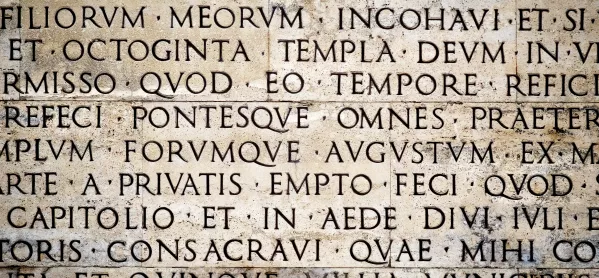DfE awards £4m Latin scheme to Future Academies

The government has awarded its controversial £4 million Latin “levelling-up” programme, aimed at disadvantaged pupils across 40 state schools, to Future Academies.
The programme was first unveiled by former education secretary Gavin Williamson last July in an effort to challenge perceptions of the ancient language as “elitist” and “for the privileged few”.
The government said today that the scheme - aiming to encourage more students to take Latin GCSEs - will be run by Future, which was set up by a former schools minister Lord John Nash.
The announcement of the programme received a mixed reception last year, with Geoff Barton, general secretary of the Association of School and College Leaders (ASCL), warning that the “worrying decline” in interest in modern languages should take priority.
Future Academies will first select seven schools in its own trust and a further 13 state-maintained, non-selective schools outside of London and the South East, which already teach Latin but only to low numbers of pupils.
- Background: Heads criticise Williamson’s ‘typical’ Latin focus
- Teaching: Latin teachers could use Taylor Swift lyrics to ‘engage’ students
- Opinion: Latin? Get teenagers to do a Btec, instead
The Centre for Latin Excellence, which the trust will launch in September 2022, is currently inviting schools to apply to take part.
Its website says the programme will include teaching one lesson of Latin each week to Year 7 and increasing this over four years.
Schools that are accepted onto the programme will also receive “dedicated funding to cover recruitment, staffing, resources and enrichment”.
They will also get access to a “fully-resourced, knowledge-rich curriculum designed to support students at every level”, the website says.
And schools will be able to access ongoing coaching of Latin teachers in addition to a CPD programme.
Future Academies has also said that schools will have the chance to become a regional hub in the second year of the programme and receive additional funding to develop a “local network of schools teaching Latin in target areas”.
Education secretary Nadhim Zahawi said that learning Latin in school “should not be the preserve of a fortunate few”.
He added that the programme will give “thousands of students” the chance to take part in “enriching activities and lessons informed by some of the best Latin teaching in the country”.
Mr Zahawi said he hopes the programme will ”mirror the success” of the Mandarin Excellence Programme “in closing the divide between the subjects children can access in state and independent schools”.
He added that he wants to encourage schools to sign up in order to give their pupils the opportunity to learn more about the “ancient world” and a ”stronger grasp of modern foreign languages”.
Paul Smith, chief executive officer of Future Academies and a former Department for Education regional schools commissioner, said the contract was part of “one strand” of bigger projects the Future Academies’ Curriculum Centre is developing.
Geoff Barton, general secretary of the Association of School and College Leaders (ASCL), said that learning Latin is “often perceived as the preserve of a privileged few” and it was good to see the government encouraging wider participation. ASCL also wished Future Academies “every success”.
But Mr Barton also said that the government should put more emphasis on “the much larger issue of the decline in the take-up of modern foreign languages at GCSE over the past 20 years”.
He added that these subjects are “critically undermined by severe teacher shortages which makes the English Baccalaureate ambition of 90 per cent take-up completely unobtainable”.
“A national strategy is needed to boost a love of language learning, encourage young people to study for these qualifications, and provide more language teachers.”
Last year, the DfE also announced the next step in its £16.4 million Mandarin Excellence Programme, as well as the fourth year of the £4.8 million Modern Foreign Language Pedagogy Pilot, to support the teaching of French, German and Spanish to GCSE.
You need a Tes subscription to read this article
Subscribe now to read this article and get other subscriber-only content:
- Unlimited access to all Tes magazine content
- Exclusive subscriber-only stories
- Award-winning email newsletters
Already a subscriber? Log in
You need a subscription to read this article
Subscribe now to read this article and get other subscriber-only content, including:
- Unlimited access to all Tes magazine content
- Exclusive subscriber-only stories
- Award-winning email newsletters



